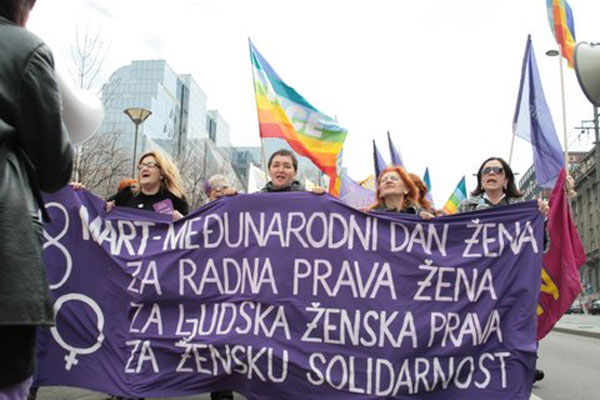Serbian police officer urged hooligans to fight women’s rights activists
A police officer urged football hooligans to unite and attack women advocating for peace in Serbia. Now, two years after his threatening Facebook post, the man is being tried in court. Serbian women’s rights activists demand their government stand up for them.

When he made the threats, the man currently on trial was employed by the anti-terrorism unit of Serbia’s police force. He felt a peace demonstration organised by Kvinna till Kvinna’s partner organisation, Women in Black, was “anti-Serbian”. So he wrote on his Facebook page that hooligans should unite and attack the women’s rights activists (rather than each other).
Constant fear
The police officer’s actions were desastrous for Women in Black. Since its founding in 1993, the organisation has always faced threats and attacks – but never as many as after the Facebook post.
“The two years since the events have been very, very difficult for us. We’ve had to spend so much energy on security measures that we are all completely exhausted,” says Stasa Zajovic, one of the founders of Women in Black in Belgrade.
Stasa Zajovic mentions many employees and members have left the organisation because of the looming threats against them and their loved ones.
Authorities need to react quicker
It has taken the Serbian authorities two years to bring the police officer to court. There is a risk proceedings will be drawn out until the statute of limitation expires, or that the accused will simply be acquitted.
“It’s important to put pressure on the authorities now. The Serbian government needs to react quicker and take crimes against human right defenders seriously. By not pursuing this case, the state is sending the message that none of this is very important. They should be making it clear that threats and attacks like these are unacceptable and punishable offences,” fumes Milica Mirazic, programme officer at Kvinna till Kvinna’s Belgrade office.
Threats and attacks becoming more frequent
The incident with the police officer is just one of many examples showing that women’s rights activists in Serbia are having a tough time.
“In recent years, threats and attacks have become more frequent. Many who work for women’s rights in Serbia have been singled out by the media, or physically attacked when arranging public activities. Perpetrators include both right-wing extremists and nationalists groups, as well as the government,” says Aleksandra Nestorov at Kvinna till Kvinna’s partner organisation Autonomous Women’s Centre.
To call attention to this negative trend, Autonomous Women’s Centre compiled a report with examples of attacks and abuse during the past two years. The report was sent to relevant actors within the international community.
“We demand the Serbian government charge and punish the attackers. The government needs to guarantee the security of those working to protect human rights,” says Aleksandra Nestorov.